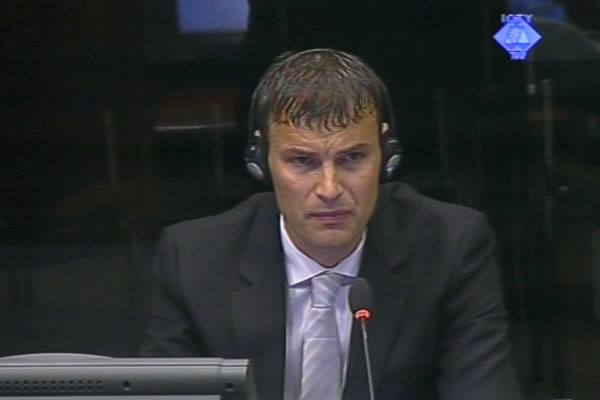Home
RATKO MLADIC BLAMES SERB CIVILIANS
Continuing the cross-examination of Elvedin Pasic, the first prosecution witness, Ratko Mladic’s defense contested the allegation in the indictment that about 150 Muslims detained in the school in Grabovica, near Kotor Varos, were executed. ‘If something did happen’ to those people, the defense argued, the army under the command of the accused was not responsible. Mladic’s defense blames ‘local civilians’
 Elvedin Pasic, witness at the Ratko Mladic trial
Elvedin Pasic, witness at the Ratko Mladic trial Ratko Mladic’s defense denies that a crime was committed in the village of Grabovica near Kotor Varos. Yesterday, Elvedin Pasic, whose father was killed there, testified about the incident as the first prosecution witness at the trial of the former VRS Main Staff commander. Before continuing his cross-examination today, Mladic’s defense counsel Branko Lukic presented the defense case: since the bodies of the victims have never been recovered, there is no evidence that the 150 Muslims captured as they tried to reach Travnik were actually executed. If ‘anything did happen’ to those people, ‘the local civilians are responsible’ and not the army headed by the accused, Lukic said.
Through Elvedin Pasic’s evidence, the prosecution wants to prove the pattern of ethnic cleansing implemented by the forces under the command of the accused in 1992 in about 20 municipalities in Bosnia and Herzegovina. In Kotor Varos and some other areas, the ethnic cleansing reached the scale of genocide. The murder of 150 persons in the school in the village of Grabovica that the defense contested or blamed on ‘the local [Serb] civilians’ is one of the facts adjudicated at previous trials at the Tribunal.
In the cross-examination, the witness repeated that both the armed Serbs he saw in the villages around Kotor Varos, and those who in early November 1992 captured the group of about 150 to 200 men and some 20 women and children, appeared to be part of an organized military unit. They wore camouflage uniforms with insignia and ranks. The defense lawyer read out parts of the witness’s statements in which he said that some of them rode on tractors and didn’t drive military vehicles, and that there was a woman among soldiers.
The defense wants to prove that some of the victims who are alleged to have been killed in Grabovica were in fact killed elsewhere. To corroborate the argument, Lukic tendered into evidence statements taken from the family members of Nedzad Menzel and Seval Opakic. Their relatives spoke about their disappearance, saying that Menzel and Opakic were last seen when ‘they were ambushed by Chetniks’ as they tried to break through towards Travnik. Pasic nevertheless remained adamant that he saw both Menzel and Opakic in the tunnel where the Serb soldiers captured them and took them to the school in Grabovica. Presiding judge Orie was prompted to note that their family members weren’t there at the time when the events they described in their statements to local courts had taken place. The statements don’t specify the source of their information, the presiding judge remarked.
The defense counsel pointed out the purported inconsistencies in Pasic’s evidence. Lukic recalled that the witness first said that he and other men were robbed of everything when they were captured and they ‘didn’t have as much as a pin’, only to say later that they were robbed again on the way from Grabovica to Travnik. The witness explained that he and a few other lucky men who had been allowed to leave Grabovica really didn’t have any valuables worth robbing: in fact, the refugees from the area of Kotor Varos who were travelling to Travnik across Vlasic in a convoy of about 10 buses had money and other valuables.
The defense counsel also insisted that not all Muslim and Croat villages were attacked and destroyed, but only those from which attacks on Serb units were launched. When the prosecutor re-examined the witness, Pasic said that the representatives of the village of Dabovica, where his sister lived, signed a pledge of loyalty to the Serb authorities, and yet a group of Muslim men from the village were detained in a barn. They were shot to death and then burned.
At the end of his testimony, Elvedin Pasic asked all those who have any information about his father, whose body has never been found, to forward it to him. In tears, Pasic said he missed his father. ‘I miss him now more than ever, now that I am a father myself; everything I do with my children brings back memories of my father’, the first prosecution witness at the trial of Ratko Mladic said at the end of his evidence.
As the hearing continued today, former chief of the civil affairs in the UN sector in BH David Harland began his evidence.
Linked Reports
- Case : Mladic
- 2012-07-09 ORDEAL OF MUSLIMS FROM VILLAGE OF HRVACANI
- 2012-07-09 MLADIC’S DEFENSE: TRIAL CHAMBER SUCCUMBED TO THE POLITICAL PRESSURE FROM THE PROSECUTION
- 2012-07-05 MLADIC’S MOTION TO POSTPONE EVIDENCE OF THREE WITNESSES DISMISSED
- 2012-07-11 DEFENSE: SERBS DID NOT TERRORIZE SARAJEVO, THEY SANCTIONED IT
- 2012-07-12 MLADIC IS UNWELL, TRIAL ADJOURNED
- 2012-07-13 MLADIC UNDERGOES MEDICAL TESTS
